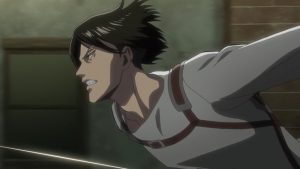 Here’s the funny thing about Shingeki no Kyoujin (which actually can be a riot, though often not on purpose). For me, continuing to cover it breaks pretty much every golden rule I set for myself as an anime writer. I’ve always felt that it was karmic poison to keep blogging a series once you’d turned against it on a fundamental level, first of all. I don’t like to give spotlight to nationalist authors (not that it matters with a franchise this popular, of course), and life being as short as it is, I’ve tried to evolve to a point where I was only covering shows I really like.
Here’s the funny thing about Shingeki no Kyoujin (which actually can be a riot, though often not on purpose). For me, continuing to cover it breaks pretty much every golden rule I set for myself as an anime writer. I’ve always felt that it was karmic poison to keep blogging a series once you’d turned against it on a fundamental level, first of all. I don’t like to give spotlight to nationalist authors (not that it matters with a franchise this popular, of course), and life being as short as it is, I’ve tried to evolve to a point where I was only covering shows I really like.
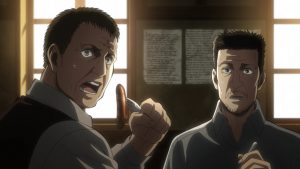 But for some reason, I can’t quite quit Attack on Titan. The weirdest part of it that unlike almost every other example of a show I’m this ambivalent about, this one remains kind of interesting to cover. Narratively it’s a mess, most of the characterization is a dumpster fire, and the author’s contempt for humanism and modern liberal democracy drips from every frame. But it’s still compelling, in a strange and inexplicable way. The action can be exhilarating, and the sheer oddity of what happens on screen is close to unique – is that all there is to it, I wonder?
But for some reason, I can’t quite quit Attack on Titan. The weirdest part of it that unlike almost every other example of a show I’m this ambivalent about, this one remains kind of interesting to cover. Narratively it’s a mess, most of the characterization is a dumpster fire, and the author’s contempt for humanism and modern liberal democracy drips from every frame. But it’s still compelling, in a strange and inexplicable way. The action can be exhilarating, and the sheer oddity of what happens on screen is close to unique – is that all there is to it, I wonder?
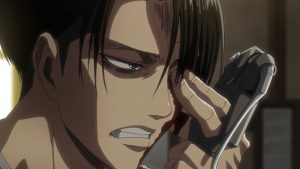 One things for sure – this is the part of the story where the ugliness of Isayama’s worldview really starts to become inescapable. The glorification of torture, which fascists keep glorifying – and using – despite the fact that it doesn’t work (why? because it’s fun for them). The contempt for the weakness (as he sees it) embodied in Armin, exemplified by his addition to nuance and his aversion to killing. The abject embrace of consequentialism (every bit as vile a philosophy now as it was when Urobuchi championed it in Fate/Zero). It’s pretty much a nationalist’s one-stop shopping superstore.
One things for sure – this is the part of the story where the ugliness of Isayama’s worldview really starts to become inescapable. The glorification of torture, which fascists keep glorifying – and using – despite the fact that it doesn’t work (why? because it’s fun for them). The contempt for the weakness (as he sees it) embodied in Armin, exemplified by his addition to nuance and his aversion to killing. The abject embrace of consequentialism (every bit as vile a philosophy now as it was when Urobuchi championed it in Fate/Zero). It’s pretty much a nationalist’s one-stop shopping superstore.
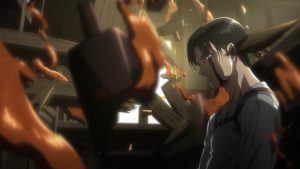 But, well… Anything involving Armin is almost invariably more interesting than anything else character-based in Shingeki no Kyoujin, even if it’s probably unintentional. Even if Armin’s views are clearly discredited by the author it’s important for the series that there is at least someone in it to express them. And as usual, his observational monologues are the framing device that tell us where this series is really going, and seeing him not contrasted by close proximity with Levi – probably the most absolute anti-Armin by nature in a cast full of them – is kind of fascinating.
But, well… Anything involving Armin is almost invariably more interesting than anything else character-based in Shingeki no Kyoujin, even if it’s probably unintentional. Even if Armin’s views are clearly discredited by the author it’s important for the series that there is at least someone in it to express them. And as usual, his observational monologues are the framing device that tell us where this series is really going, and seeing him not contrasted by close proximity with Levi – probably the most absolute anti-Armin by nature in a cast full of them – is kind of fascinating.
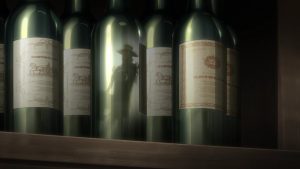 Then you add in the fact that any episode Eren spends mostly unconscious has a big leg up, and this week had a lot going for it. The fact that we’re almost surely headed up another time-wasting blind alley as far as the canon plot is concerned is kind of a drag, but so far at least this season has been an entertaining lark without lapsing into the abject absurdity which, while it may be Shingeki’s calling card, is probably best served in small doses…
Then you add in the fact that any episode Eren spends mostly unconscious has a big leg up, and this week had a lot going for it. The fact that we’re almost surely headed up another time-wasting blind alley as far as the canon plot is concerned is kind of a drag, but so far at least this season has been an entertaining lark without lapsing into the abject absurdity which, while it may be Shingeki’s calling card, is probably best served in small doses…


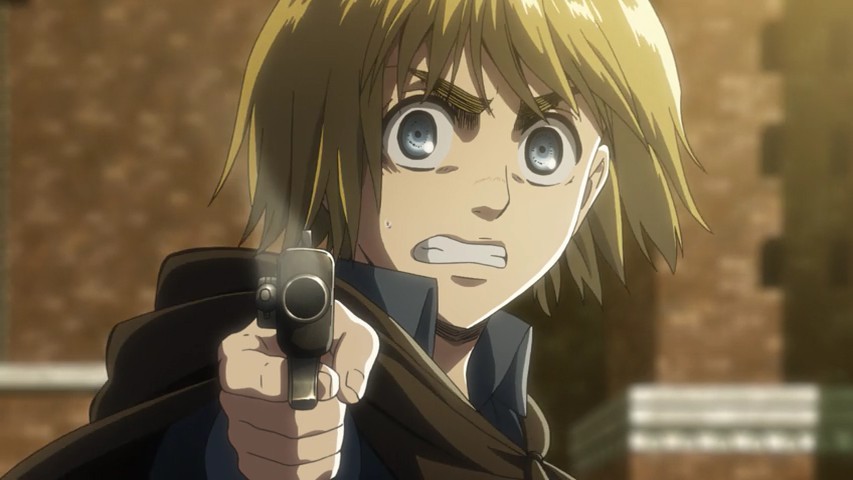


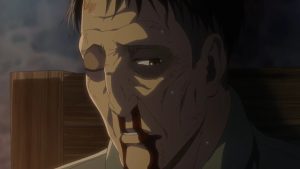
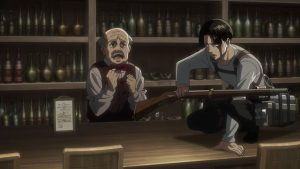
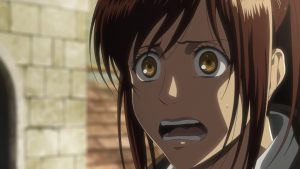
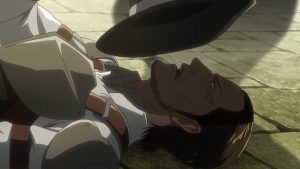
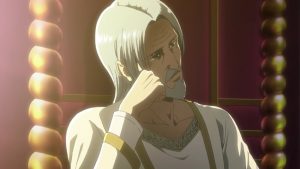
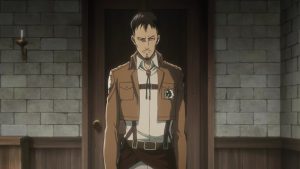
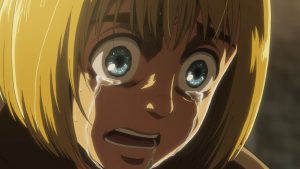

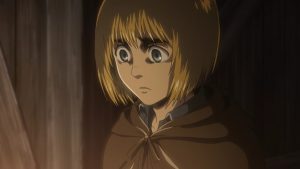
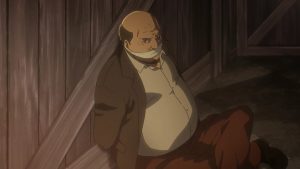
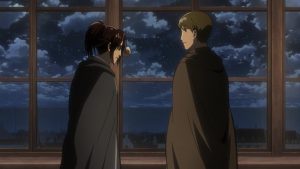
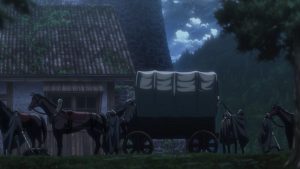
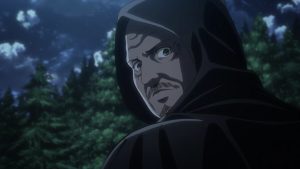
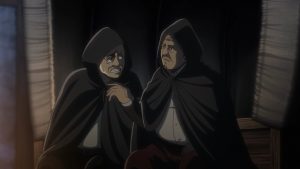
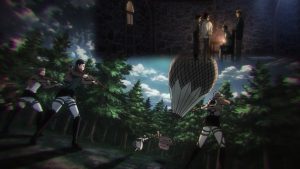
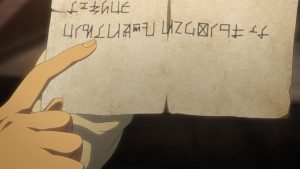
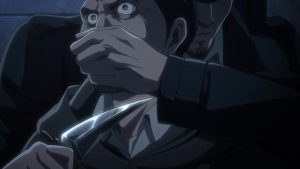
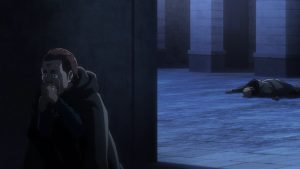
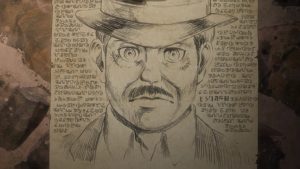
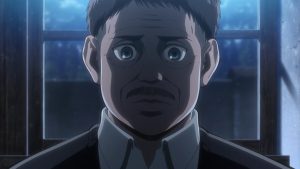
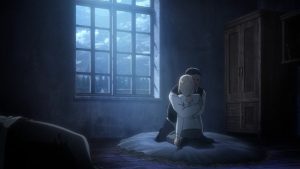
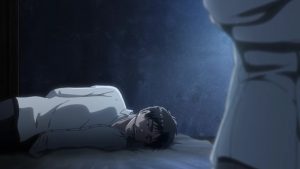
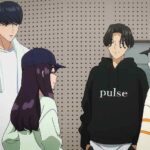

Simone
July 31, 2018 at 7:40 am“The abject embrace of consequentialism”
I don’t think consequentialism is necessarily that vile – nor that beloved by fascists, for that matter. A lot of it depends on what you hold to be a good worth pursuing to begin with. Some utilitarian (and therefore consequentialist) doctrines are in fact if anything so extremely altruistic they become practically untenable. And if one wanted to be a pure consequentialist, why pursue and glorify death? That seems a pretty awful consequence to pursue. A utilitarian wouldn’t make a very good soldier.
Personally I’d say the big issue with consequentialism is that its opposite, deontological ethics, helps cement social trust by giving everyone a shared core of values they can rely on. But fascism, too, can leverage this approach – in fact that’s what all the ritual and the mythology are for. It’s just a different sort of deontology, one built around war, glory and charisma rather than around empathy or respect for human life. I’d say both things lay on an axis that’s orthogonal to fascism-liberalism.
Deluxe
July 31, 2018 at 10:09 amWhether you like it or not, most of the greatest anime franchises have some sort of nationalism within. Space Battleship Yamato and Neon Genesis Evaneglion (the latter of which Shingeki borrows a lot from) cannot be considered without their nationalistic undertones. One of my favorite anime director, Ryousuke Takahashi, was almost explicitely facsist and racist in some of his works. Not to mention Hayao Miyazaki whose last movie was an eulogy of the creator of the plane which striked Pearl Harbor.
The slice-of-life and moe craze from past years is also a reaction from the Japanese audience who felt their way of life was being threatened by globalization and decided to paint it in a glorified and romanticized way – studios like KyoAni made their entire business around this idea.
The issue with Shingeki is that it uses most of the nationalist rhetoric for shock value rather than making any sort of statement. It’s just an average zombie survival story at this point.
Simone
July 31, 2018 at 10:40 amThis is a bit different. Miyazaki also made “Porco Rosso” where the protagonist openly says “better to be a pig than a fascist”. If one knows a bit Miyazaki’s opus, it is pretty clear that he’s no nationalist, but that he absolutely LOVES flight and everything related to it. Doesn’t surprise, thus, that he would be fascinated by an engineer who designed planes. And “The Wind Rises” IMHO nails perfectly one of the big dilemmas of being a scientist or engineer: you do your work because you enjoy it and have pride in your creations, but then those creations may have unsavoury uses, and your creative glee be complicit of atrocities. On the other side of the barricade, Einstein and many other physicists could have felt the same once the atomic bomb was complete.
There’s always been some nationalism in a lot of anime, but for that matter, there’s nationalism in US movies as well. This isn’t just about “Japan is the best!” rhetoric. Isayama goes a bit beyond that, and so does Attack on Titan (if you read the manga you’d know the details of that).
Guardian Enzo
July 31, 2018 at 3:49 pmGreat response. I did like 17 paragraphs on this in my review of Kaze Tachinu, but the bottom line is – if you know Miyazaki’s ethos, he’s as anti-nationalist as it gets.
Psyric
July 31, 2018 at 4:31 pmI do read the manga, and I still don’t quite agree. There are moments to come that are written with such genuine pathos that I find it very hard to believe Isayama’s point is to say “this is wrong and weak thinking”. I don’t believe he’d be capable of writing characters like Armin or some of their perspectives so clearly if he actually thought that.
Simone
August 3, 2018 at 12:56 amI don’t think you quite get it, and IMHO this is because we tend to think of fascists or right wing nationalists as way too one-dimensional villainous types. The philosophy isn’t THAT delusional – at least for the ones who aren’t mere stupid thugs, and there’s plenty of those. It’s not about not knowing that those people exist or not understanding their line of thought. It’s about believing that, simply put, the world isn’t kind enough to allow them to be that way. Freedom and peace are a luxury and we don’t have the right to that luxury – we never do, because there’s always another enemy to crush, one who WILL crush us in return if we’re too weak and lower our guard. Weakness isn’t intrinsically evil, but it leads to death; and thus, tragic as it may be, it can’t be coddled.
Consider that fascism revels in narrative. Like all grand ideologies (as well as religions) it isn’t as concerned with individual well-being as it is with a good story; and the kinds of story fascism loves the most are epics. Some civilian living long and reasonably happily and dying 80 year old in his bed is boring. A soldier pouring his blood on the battlefield heroically is memorable. Even tragedy – some humans being simply fated to be too weak to take part of this glory, and thus fated to fall – is part of the story. What never is, and can’t be, is rationality, level-headedness, and all those things that settle for petty material gains (health, well-being, peace) rather than striving for this warrior-spiritual ideal.
Simone
August 3, 2018 at 12:59 am(and I’ll add that in this sense, Attack on Titan is probably an EXCELLENT textbook in understanding how fascism ticks; it gets the ideology down to a T. A similar textbook is Robert Heinlein’s Starship Troopers, though I consider that more moderate while still pretty right wing, and it’s actually a book that helped me understand a lot more why right wing people think what they think and how they act in consequence of that)
Guardian Enzo
July 31, 2018 at 3:50 pmI disagree here, Isayama very much has an agenda and he uses AoT to articulate it. Not all the time, but certainly in sum.
The wild guesser
July 31, 2018 at 10:33 amHonestly, I don’t see Armin’s treatment Thisbe episode particularly negatively. Considering humanity is inb the brink of extinction, I can see how taking a human life is extremely taboo in this society.
Armin’s shock over taking human life and Levi’s “pep talk” is featured in almost every military movie/ series ever made when it comes to the concept of a green soldier’s first kill, so it doesn’t be really stand out to me as the author’s anti-Armin bias in this particular occasion than just a basic military genre trope.
d m
July 31, 2018 at 8:06 pmPart of my disagreements with you are because I read the manga, but part are because I just disagree with you. For the second case, I just can’t see how you’d think Isayama dislikes Armin. He has way more character depth than Mikasa (whose dialogue could almost entirely be replaced by exclamations of EREN!) out of the two childhood friends, and it’s not as if he visits especial suffering on him that other characters are spared.
Nayrael
August 4, 2018 at 6:37 amIf Isayama is a Fascist, then he is a damn weird one: the entire AoT is written to be a big middle finger to Fascists, and the arc that will most likely be animated only in Season 4 explicitly focuses on issues like Fascism and Imperialism, and showing just how damn awful they are… and how much good people suffer because of them and their petty ideals.
The arc that is currently being animated shows how disgusting and fucked up Police States are, and Armin’s “We are becoming bad guys now” scene is something that becomes more and more common as the story goes on, as the author does not want, even for a moment, for you to think that what the Protags are doing is a good thing.
I’d say more, but that would be going into spoilers. Let’s wait until the characters reach Eren’s basement. Stuff that is discovered there is… oh boy.
Guardian Enzo
August 4, 2018 at 6:57 amYeah, suffice to say we disagree on that assessment. Like, utterly and violently disagree. But there’s absolutely no way we can discuss it in an open forum like this for spoiler reasons, so everyone will just have to decide for themselves when the time comes.
Bob
August 4, 2018 at 8:46 pm“The abject embrace of consequentialism (every bit as vile a philosophy now as it was when Urobuchi championed it in Fate/Zero).”
The entirety of Fate/Zero, and most starkly its finale, was dedicated to showing how Kiritsugu’s ‘the ends justify the means kill 10 to save 100’ methodology was wrong and flawed from its inception. It is only upon abandoning this mindset entirety and realizing just how horribly he has erred that Kiritsugu receives salvation in finding Shirou.
Akka
November 8, 2018 at 5:29 amI admit, I don’t really get this whole hate about “fascist-nationalistic glorification”. A show like Gate ? Yeah, it drips from what can only be described as fetishizing. But AoT so far ?
First, we’re in a different setting, where for all the characters know, they are defending an humanity on the verge of extinction against mindless giants who wish to eat it – it’s not a matter of enslaving your neighbour, it’s a matter of raw survival, so I would give it a lot more leeway in the glorification of self-sacrifice.
Second, even if the author has sympathy for fascism, he’s at the very least giving a good amount of lip-service to presenting alternative viewpoints in a non-caricatural manner. Armin being decent and noticing they are becoming monsters themselves and that the other person might be a nice one, Jean pointing the tragedy that they kill others just because they are on the “other side” and not because of them being evil, even Levi giving them a pep talk but with the caveat that it’s not about them being “right”… Also the “enemies” being the official police of a totalitarian state.
Not to speak about other characters in previous episode which were about “try to live for yourself” (basically the opposite of “the individual is just a cog in the state machine”) or showing the despair of people who are crushed by the iniquity of what they were seemingly forced to do.
That’s a pretty lousy ode to fascism here, which is about “follow the leader, ignore ethics, we’re right and everyone else is wrong and we’re legitimate to enslave/kill them”.
So between the fact that the real threat of extinction makes for a pretty different context and a much higher level of tolerance for extreme measures, and the fact that the author give a pretty expansive and rather positive discourse about the moral difficulties of every character, I’ve just don’t get the outrage and feel it’s pretty much self-inflicted.